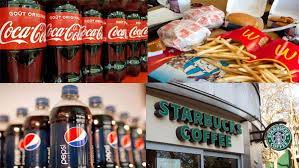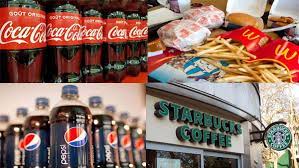
American brands McDonald's, PepsiCo, Coca-Cola, and Starbucks have all halted sales of their most well-known items in Russia, in a unified condemnation of the assault on Ukraine by corporations that define America for most of the world.
Pepsi and McDonald's were business trailblazers whose cooperation with the Soviet Union and the post-Soviet Russian state decades ago was regarded as beneficial to international relations.
All four businesses have significant activities in Russia.
McDonald's stated it will continue to pay salaries to its 62,000 Russian employees despite closing 847 outlets. As the Soviet Union crumbled, the first location to open in Russia, in downtown Moscow's Pushkin Square in 1990, became a symbol of blossoming American capitalism.
"I’m glad they came around and made the right decision," Jeffrey Sonnenfeld, a professor at the Yale School of Management who is tracking major companies’ stances on Russia, said after the move by McDonald's. "It’s a really important impact, and it's symbolic as much as it is substantive."
Starbucks Corp. is shutting hundreds of locations for the time being. PepsiCo Inc will halt all advertising and sales of its beverage brands in Russia but will continue to offer basics such as milk and baby food. Rival Coca-Cola has announced that it would cease operations in the country.
Despite the United States boycotting the tournament in protest of the Soviet invasion of Afghanistan, Coca-Cola was the official drink of the 1980 Olympic Games in Moscow.
Hundreds of other corporations have spoken out against Russia, including Amazon.com Inc, which announced on Tuesday that it would no longer accept new clients for its cloud services in Russia and Ukraine. Universal Music has ceased all activities in Russia, while Bumble Inc, an online dating service, will withdraw its applications from Russian and Belarusian app stores.
Earlier this week, Royal Dutch Shell Plc announced it will cease importing oil from Russia and break all ties with the nation, while the US intensified its drive to punish Moscow by blocking Russian oil and energy imports.
Moscow has described the strike as a "special military operation" intended at damaging Ukraine's military capabilities rather than conquering territory.
The West's efforts to economically isolate Russia for bombing its neighbor have wreaked havoc on global commodities and energy markets, sending prices rising and jeopardizing the recovery from the Covid-19 epidemic.
Britain, too, indicated it will prohibit Russian oil imports, but only until 2022, to provide firms time to discover new sources of supplies.
The London Metal Exchange (LME) suspended nickel trading on Tuesday after the metal's price quadrupled to more than $100,000 per tonne. Nickel is a critical component in electric car batteries.
Shell's decision to leave Russia comes only days after it was slammed for buying Russian oil - a move that would have been ordinary two weeks ago.
"We are acutely aware that our decision last week to purchase a cargo of Russian crude oil to be refined into products like petrol and diesel - despite being made with the security of supplies at the forefront of our thinking - was not the right one, and we are sorry," Chief Executive Ben van Beurden said.
Shell and rivals BP Plc and Exxon Mobil Corp (XOM.N) have all announced plans to sell holdings in Russia and exit the country, leaving France's TotalEnergies (TTEF.PA) relatively isolated in hanging on to its investments there. read more
(Source:www.cnbc.com)
Pepsi and McDonald's were business trailblazers whose cooperation with the Soviet Union and the post-Soviet Russian state decades ago was regarded as beneficial to international relations.
All four businesses have significant activities in Russia.
McDonald's stated it will continue to pay salaries to its 62,000 Russian employees despite closing 847 outlets. As the Soviet Union crumbled, the first location to open in Russia, in downtown Moscow's Pushkin Square in 1990, became a symbol of blossoming American capitalism.
"I’m glad they came around and made the right decision," Jeffrey Sonnenfeld, a professor at the Yale School of Management who is tracking major companies’ stances on Russia, said after the move by McDonald's. "It’s a really important impact, and it's symbolic as much as it is substantive."
Starbucks Corp. is shutting hundreds of locations for the time being. PepsiCo Inc will halt all advertising and sales of its beverage brands in Russia but will continue to offer basics such as milk and baby food. Rival Coca-Cola has announced that it would cease operations in the country.
Despite the United States boycotting the tournament in protest of the Soviet invasion of Afghanistan, Coca-Cola was the official drink of the 1980 Olympic Games in Moscow.
Hundreds of other corporations have spoken out against Russia, including Amazon.com Inc, which announced on Tuesday that it would no longer accept new clients for its cloud services in Russia and Ukraine. Universal Music has ceased all activities in Russia, while Bumble Inc, an online dating service, will withdraw its applications from Russian and Belarusian app stores.
Earlier this week, Royal Dutch Shell Plc announced it will cease importing oil from Russia and break all ties with the nation, while the US intensified its drive to punish Moscow by blocking Russian oil and energy imports.
Moscow has described the strike as a "special military operation" intended at damaging Ukraine's military capabilities rather than conquering territory.
The West's efforts to economically isolate Russia for bombing its neighbor have wreaked havoc on global commodities and energy markets, sending prices rising and jeopardizing the recovery from the Covid-19 epidemic.
Britain, too, indicated it will prohibit Russian oil imports, but only until 2022, to provide firms time to discover new sources of supplies.
The London Metal Exchange (LME) suspended nickel trading on Tuesday after the metal's price quadrupled to more than $100,000 per tonne. Nickel is a critical component in electric car batteries.
Shell's decision to leave Russia comes only days after it was slammed for buying Russian oil - a move that would have been ordinary two weeks ago.
"We are acutely aware that our decision last week to purchase a cargo of Russian crude oil to be refined into products like petrol and diesel - despite being made with the security of supplies at the forefront of our thinking - was not the right one, and we are sorry," Chief Executive Ben van Beurden said.
Shell and rivals BP Plc and Exxon Mobil Corp (XOM.N) have all announced plans to sell holdings in Russia and exit the country, leaving France's TotalEnergies (TTEF.PA) relatively isolated in hanging on to its investments there. read more
(Source:www.cnbc.com)














